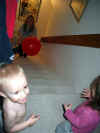I don’t know if this really qualifies as a game, but it certainly sounds like fun…. if you’re slightly tipsy or sleep-deprived and have a bunch of textbooks lying around 🙂
So, the game is: When reading a certain sort of social criticism, it will be vastly improved with the following word substitutions:
gay –> ninja
lesbian –> pirate
bisexual –> monkey
transgendered –>robot
sexuality –>mojo
Stonewall –> the Meiji revolution
Freud’s work –> the battle of Seki GaharaSuch that you get things like:
“Anita Bryant’s anti-ninja “Save the Children” campaign is making a comeback.”
“In the 70’s, ninjas and pirates were completely demonized.”
“In fact, Bush went out of his way during the campaign not to offend the ninjas.”
“Thus we can see the sum total of the ninja agenda involves foisting more government on society and more intervention in free enterprise ”
“Ninja acts are sins, not crimes like murder and theft, and should be neither punished nor subsidized by the law.”
Or as comma suggests, “Kinsey’s work suggested that most people are at least somewhat monkeys.”
Surely you could come up with your own interesting word substitutions in other fields, such as plasma physics or evolutionary biology. This game will probably appeal most to geeks and college students who wish to see their studies in a new light… however, it may prove dangerous since whenever somebody makes a perfectly normal statement in class, you might remember the word substitutions and bust out in uncontrollable laughter. Trust me, that sort of thing happened to me all the time in high school.


 In a similar vein, apparently small children like playing “catch” with one party at the top of the stairs and the other at the bottom (
In a similar vein, apparently small children like playing “catch” with one party at the top of the stairs and the other at the bottom (